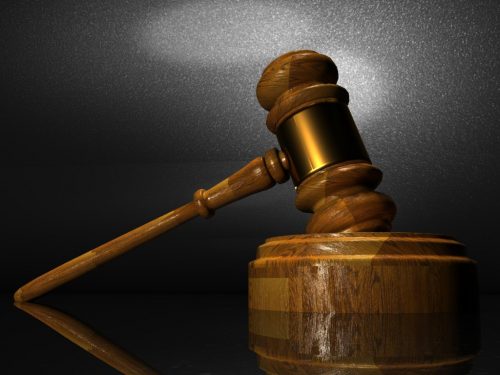By Gloria Gomez/UA Don Bolles Fellow/AZ Mirror
PHOENIX — Undocumented immigrants on supervised probation who have been convicted of a misdemeanor or felony would have their pictures published online under a new legislative proposal framed as a way to collect data on crime rates in the immigrant community — but critics say it’s simply an attempt to single them out.
K.M. Bell, an attorney for the Arizona Chapter of the American Civil Liberties Union, said during a Senate Judiciary Committee hearing on Thursday that singling out and collecting data from undocumented immigrants contributes to the idea that they cause the most crime, when in fact the reverse has been found to be true. A 2020 Texas study reported that U.S.-born citizens are more than twice as likely than undocumented immigrants to be arrested for both violent and drug crimes, and four times as likely to be arrested for property crimes.
“This isn’t actually about collecting aggregate data, it’s about publicly shaming individual people,” Bell said.
Rep. John Kavanagh, however, maintains that illegal immigrant crime rates remain unclear. The Fountain Hills Republican sponsored House Bill 2326 to address that issue. The bill requires all superior court probation departments in the state to submit the photos and information of every undocumented immigrant with a felony or misdemeanor conviction on probation to the Arizona Criminal Justice Commission to publicly publish on its website. That information includes their name, height, weight, crime and sentence details.
The commission monitors, provides resources for and develops reports about criminal justice programs across the state. Nathan Wade, a defense attorney and member of the Arizona Attorneys for Criminal Justice board of directors, said the bill goes directly against the commission’s mandate to help improve the criminal justice system through data collection.
“This bill turns ACJC, our top criminal justice reporting agency, into a mugshot factory aimed at targeting one group of people,” he said.
The permanence of the online records also affects the long-term outlook of those convicted. Employment and housing opportunities are negatively affected by an easily accessible criminal record. Bell reminded the panel that current state law outlaws mugshot companies from profiting off of online criminal records precisely because legislators in 2019 recognized the harm it could do to people who had already completed their sentencing requirements.
Bell also argued that there’s no viable public safety concern served by the bill’s requirements, as misdemeanors can include nonviolent crimes like shoplifting, property damage and driving with a suspended license.
Abdi Lopez, who is herself a first-generation immigrant, spoke against the bill, saying it’s unfair to treat undocumented criminals differently than other criminals.
“If you and I speed 20 miles above the speed limit, you and I have the right to privacy — that our photos, our height and our weight will not be made public,” she said.
In Arizona, reckless driving is a class 2 misdemeanor.
Lopez warned that the bill may lead to the systematic targeting of undocumented immigrants and their families because anyone has access to the database.
Jeziel Ayala, who is from a mixed-status family — meaning some members are in the country legally and others are here illegally — said he’s grown up with plenty of discrimination and that he fears the bill would only serve to increase it, putting his relatives at risk.
“I deserve to have peace of mind that those I love will not be treated differently,” he said.
Sen. Martin Quezada, D-Glendale, echoed these fears, saying the bill would not only hurt families with undocumented members but also lead to increased fear of anyone who is perceived as Hispanic, regardless of citizenship status. He called the bill mean-spirited and said it harkened back to Senate Bill 1070 from 2010, which he said was a step backwards and would only serve to deepen community divisions by increasing xenophobia. .
“This is about public shaming and placing a target on certain individual’s backs in our community and that is only strengthening and furthering the divisions in our community,” he said.
Sen. Warren Petersen, R-Gilbert, responded to claims that the bill would increase anxiety in the immigrant community by saying that if immigrants to the U.S. followed the proper legal avenues, there’s nothing to fear or object to in the bill.
“We gotta ask ourselves why are we anxious and in fear? What is causing that fear? Well, we’ve all been given a conscience, and if we’re doing something wrong, we’re afraid we’re going to get caught,” he said.
Petersen, who chairs the committee, added an amendment to the bill that would also require sheriffs to publicly disclose online or by phone if any prisoner in their custody has a federal immigration hold. Holds are placed when Immigrations and Customs Enforcement officials request that sheriffs keep prisoners in custody for 48 additional hours to determine whether they have violated immigration law. It isn’t a guarantee that they have done so.
The bill passed 5-3 along party lines and goes next to the full Senate for debate.
Gloria Gomez, a senior at the University of Arizona, is the 2022 UA School of Journalism’s Don Bolles Fellow working with editors from the Arizona Mirror. Gomez has interned at the Arizona Daily Star and worked at the Arizona Daily Wildcat. She is a dual major in journalism and political science, with a Spanish minor. She’s a member of the Investigative Reporters and Editors and National Association of Hispanic Journalists. The UA School of Journalism started the fellowship in 1977 to honor Don Bolles, an Arizona Republic reporter killed in a 1976 car bombing.

